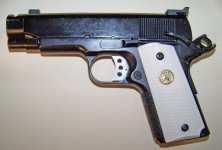The Red Dot Optic is becoming more mainstream for self-defense and carry but haven’t read much about carrying pistols with compensators. There are a lot of pistol compensators on the market but it seems they are not making much headway in concealed carry.
The reason I ask is I have a Glock 43X. I have moded it with Shield Arms 15 round magazines and a flat face trigger. The right compensator will give me about the slide length of the Glock48 making holster selections easier. The main reason of course is reducing the recoil particularly with hot self-defense ammunition. The final result will be a Glock 19 on a diet.
Since S&W offers similar pistols I imagine there is interest in this also.
Any user feedback will be appreciated.
The reason I ask is I have a Glock 43X. I have moded it with Shield Arms 15 round magazines and a flat face trigger. The right compensator will give me about the slide length of the Glock48 making holster selections easier. The main reason of course is reducing the recoil particularly with hot self-defense ammunition. The final result will be a Glock 19 on a diet.
Since S&W offers similar pistols I imagine there is interest in this also.
Any user feedback will be appreciated.
Last edited:



